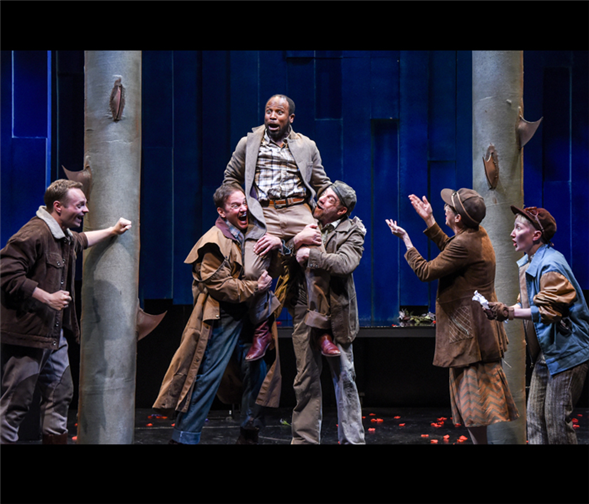A new theatre company passionately believes they can
---
Attracting young-adult audiences to the theatre has long been a challenge due to skyrocketing ticket prices and a perceived disconnect from mainstream culture. But Masterworks Theater Company hopes to change that. Founded by veteran New York City producer Eric Krebs, the troupe specializes in affordable, engaging, and professional revivals of lauded classics for the next generation. Its inaugural season recently kicked off with Tennessee Williams' "The Glass Menagerie" and continues this month with Shakespeare's "A Midsummer Night's Dream" at the 47th Street Theatre. TDF Stages chatted with Masterworks artistic director Christopher Scott about this ambitious venture.
Sander Gusinow: How did Masterworks Theater Company get started?
Christopher Scott: Eric Krebs and I met when we were involved with
Amas Musical Theatre, which was founded at the height of the civil rights movement. Eric had this vision for a company that would produce plays for students with diverse casts, so that the kids could see themselves onstage, "reflecting the new face of America" as he liked to say. Later, when we were both working at Baruch College, we did a program where we'd bring classical plays into schools. We found that when you take these "dead white guy" plays and open them up to students through diverse casting, they really respond to them. [The company] grew out of that awareness.
SG: Why the emphasis on classics?
CS: We want to let other people own these plays. When students get to see plays from their curriculums in performance, they're like: "Oh my gosh! I never thought of it that way." For example, we brought
Antigone into a classroom where everyone thought Creon was such a jerk on paper. But afterward, someone said, "Oh, I really felt for him." With
Menagerie, someone always says, "I saw my mother up there." Not that everyone's mother is as crazy as Amanda, but she always touches on something someone's mother has said. We chose these plays because of the way they reflect the human condition, and when you use diverse casting, you open them up even more.
SG: How do these two plays reflect the human condition?
CS: The Glass Menagerie is about a family of outsiders, and Tom having to choose between loyalty to his family and living his own life. And
Midsummer… What could be better than a play about kids with these new bodies and raging hormones? Both plays have young people figuring out who they are, figuring out what love is and all the foolishness that comes with it.
SG: How do you get your target audience to come see your shows?
CS: We're trying to reach out to schools, especially schools [with low-income students]. We try to get the most amount of materials in-hand as possible. Teachers are always juggling so many things at once, electronic outreach can fall through the cracks. You have to "prime the motor," and seeing clips and pictures makes it more real. [Our efforts] have led to audiences being so diverse. Such a wide variety of people coming into the theatre together: young, old, black, white, something you don't necessarily see as much across Eighth Avenue.
SG: What's next for the company?
CS: Probably some Miller;
All My Sons or
Death of a Salesman. Something that has reader appeal. We're also thinking of doing Anouilh's translation of
Antigone, which was popular in the 1940s when France was occupied by Germany. It was also popular during Occupy Wall Street. That play's about a young person fighting "The Man." Some kids see Antigone as being totally right; others think she's a little arrogant. But that's the beauty of the play. You always bring yourself to it.
SG: You directed the company's production of
The Glass Menagerie. What do you hope audiences took away from it?
CS: That this is what Tom had to do save himself. That idea was behind every artistic decision that I made for the production. When I saw
The Glass Menagerie for the first time when I was young, that idea had a profound impact on my own life. It was really a gift being able to work on that play.
---
Sander Gusinow is a freelance writer and playwright based in New York
Photos by Russ Rowland. Top photo: The cast of "A Midsummer Night's Dream"
